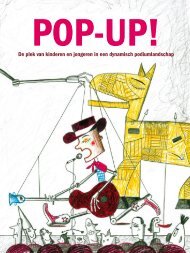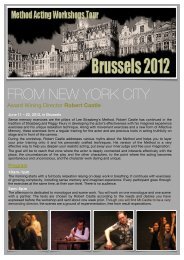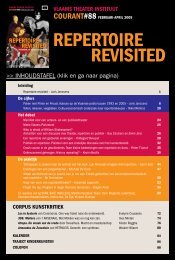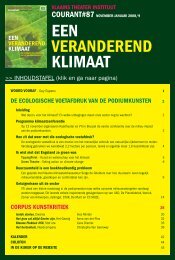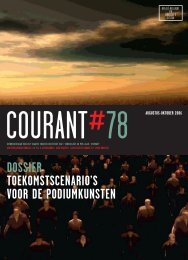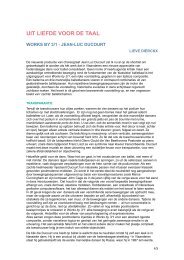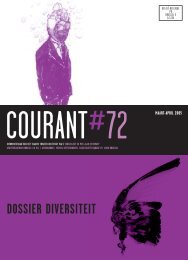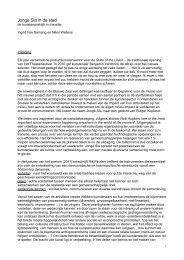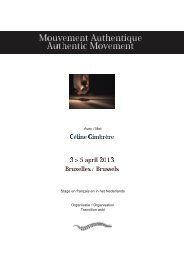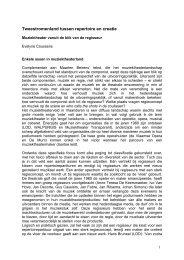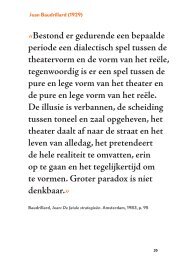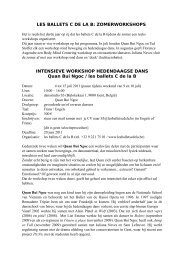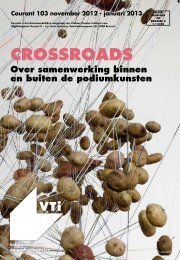music theatre in flanders - Muziekcentrum Vlaanderen
music theatre in flanders - Muziekcentrum Vlaanderen
music theatre in flanders - Muziekcentrum Vlaanderen
Create successful ePaper yourself
Turn your PDF publications into a flip-book with our unique Google optimized e-Paper software.
hISTOrICAl perSpeCTIVe<br />
In addition to the numerous small, subsidized <strong>music</strong> <strong>theatre</strong><br />
companies, 2009 will mark the arrival of two new major players:<br />
Musical van <strong>Vlaanderen</strong> (Musical of Flanders), a new company<br />
established by Geert Allaert, known from numerous previous efforts<br />
to position himself <strong>in</strong> the <strong>music</strong> theatrical landscape, and<br />
Service to Others (now known as ‘Het Verbond’), a company set<br />
up by boom<strong>in</strong>g ‘<strong>theatre</strong> animal’ and filmmaker Wayn Traub. The<br />
question can be raised to which extent these organizations can<br />
still be called ‘<strong>music</strong> <strong>theatre</strong> companies’. The systematic broaden<strong>in</strong>g<br />
of the def<strong>in</strong>itions and the current subsidy policy appear to<br />
be putt<strong>in</strong>g the dearly won identity of Flemish <strong>music</strong> <strong>theatre</strong> aga<strong>in</strong><br />
at stake. The funds required for a cont<strong>in</strong>ued growth will constantly<br />
decrease and the landscape is gett<strong>in</strong>g saturated. After well over<br />
twenty years Flemish <strong>music</strong> <strong>theatre</strong> now appears to have reached<br />
a po<strong>in</strong>t <strong>in</strong> history at which it tends to consolidate its work<strong>in</strong>g<br />
methods, resources and artistic views. The call for s<strong>in</strong>gularity<br />
is, therefore, more crucial than ever. In view of the latest subsidy<br />
decisions, it is high time to critically reconsider the struggle for<br />
self-def<strong>in</strong>ition and legitimization.<br />
For a better understand<strong>in</strong>g of this struggle for self-def<strong>in</strong>ition,<br />
the historical perspective will be helpful to situate the logic and<br />
the need of an identity with<strong>in</strong> the evolution of the artistic landscape.<br />
Such historical survey rema<strong>in</strong>s yet to be written, and may<br />
prove difficult to achieve consider<strong>in</strong>g the heterogeneity of the<br />
<strong>music</strong> <strong>theatre</strong> landscape itself. Music <strong>theatre</strong> is <strong>in</strong> constant motion.<br />
I will, therefore, try to <strong>in</strong>stigate the historical perspective.<br />
The struggle for a self-def<strong>in</strong>ition is characterized by two types of<br />
def<strong>in</strong>ition. On the one hand, there are the def<strong>in</strong>itions that present<br />
themselves after some time on the basis of the occurrence of<br />
similarities with recognizable <strong>theatre</strong> forms, genres and styles.<br />
Def<strong>in</strong>itions of this k<strong>in</strong>d take shape <strong>in</strong> relation to a certa<strong>in</strong> cultural<br />
awareness and aesthetic views about the role of <strong>music</strong> <strong>in</strong> the<br />
<strong>theatre</strong>. On the other hand, the different <strong>music</strong> <strong>theatre</strong> concepts<br />
have a common <strong>in</strong>terest when it comes to self-def<strong>in</strong>ition or redef<strong>in</strong>ition:<br />
they share the desire to <strong>in</strong>stitutionalize <strong>in</strong> view of the<br />
government’s subsidy policy. It is this historical field of tension<br />
that will allow us to look at the future.<br />
IMpACT OF The TheATre<br />
Unlike the budget situation of the early 1990s, the available f<strong>in</strong>ancial<br />
resources today seem sufficient more than ever. Dur<strong>in</strong>g<br />
the last decade, <strong>music</strong> <strong>theatre</strong> def<strong>in</strong>itely ceased to be a starvation<br />
art practised by obscure composers <strong>in</strong> the w<strong>in</strong>gs of the <strong>theatre</strong><br />
and opera. The 1993 Perform<strong>in</strong>g Arts Decree (Podiumkunstendecreet)<br />
recognized <strong>music</strong> <strong>theatre</strong> as an <strong>in</strong>dependent <strong>theatre</strong> form.<br />
But now the battle for <strong>music</strong> <strong>theatre</strong> seems won and its right of<br />
existence acknowledged, the landscape threatens to saturate and<br />
the dearly won identity to be lost. As a result, the call for s<strong>in</strong>gularity<br />
has, aga<strong>in</strong>, become very expedient, and there are, at least, two<br />
reasons for this.<br />
First of all, ‘post-dramatic <strong>theatre</strong>’ (as described by Hans-Thies<br />
Lehmann) has caused the <strong>theatre</strong> to become <strong>in</strong>creas<strong>in</strong>gly <strong>music</strong>al<br />
and sound-aware as well as multimedia and <strong>in</strong>terdiscipl<strong>in</strong>ary –<br />
result<strong>in</strong>g <strong>in</strong> new forms of ‘total <strong>theatre</strong>’. As a result, the artistic<br />
boundaries of <strong>music</strong> <strong>theatre</strong>, as well as opera, have shifted towards<br />
<strong>theatre</strong>. In this way, post-dramatic <strong>theatre</strong> has <strong>in</strong>directly affected<br />
the stag<strong>in</strong>g practice of both <strong>music</strong> <strong>theatre</strong> and opera. The shift ‘from<br />
opera to <strong>theatre</strong>’, launched dur<strong>in</strong>g the 1980s by Gerard Mortier<br />
at the Royal Monnaie (De Munt/La Monnaie), can be regarded as<br />
an exponent of this tendency. Still, commissions for composers<br />
who wanted to experiment with <strong>music</strong> <strong>theatre</strong> <strong>in</strong> opera rema<strong>in</strong>ed<br />
scarce. Post-dramatic <strong>theatre</strong>’s effects were more noticeable<br />
42 43<br />
table of contents



